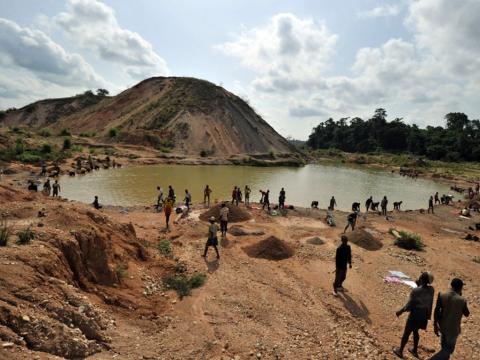By Saio Marrah
The lawyer for a group of people known as aggrieved landowners in Kono district has presented a synopsis of the case for his clients before the Court of Appeal in Freetown.
Lawyer C.M.B Jalloh, representing Aiah Fengai and 73 others made an oral presentation of their submission on Tuesday May 21st after serving the court a written document setting out their case. He told the three judge panel led by Justice Reginald Fynn that the case boils down to issues between community members, who are residents of Gbense and Tankoro Chiefdoms in Kono District and the defendant, OCTEA Mining Company.
He said the contention is that if landowners have any burning grievance arising from the activities of the mining company, they should resolve that through a grievance mechanism provided for in the Community Development Agreement (CDA), not by a lawsuit against the company.
Jalloh told the court that the defendant (OCTEA) maintained that since the aggrieved landowners had not exhausted the said mechanism, they did not have the right to take the mining company to court and that the appellants were mere beneficiaries of the CDA and not party to the signatory of the CDA. He said they also contend that the Paramount Chiefs of the two chiefdoms were the ones with authority over the lands in the chiefdoms that signed the agreement with the mining company and that only those chiefs have the right to lodge a complaint against the mining company. According to lawyer Jalloh, this position means that ordinary Sierra Leoneans do not have a right to enforce the Mines and Minerals Act of 2022 and that of the Environmental Protection Act.
He told the court that those propositions were “dangerous red herrings.” He continued: “we are stating that even if the complaint mechanism is binding it is an unenforceable agreement by virtue of being vague.” He noted that the said grievance mechanism is presided over by the very representative of the mining company, leaving ordinary stakeholders with nowhere to turn for fair redress for wrongs done by the mining company.
Lawyer Jalloh said his clients point out that the judge at the lower court ruled that the grievance mechanism covering personal injury or damage to personal property is clear that applicants have no agreement on grounds of jurisdiction. He added that even if the chiefs have absolute power over the land; that does not render the community strangers who cannot enforce the agreement.
He added that the appellant may not have signed the agreement but are beneficiaries of the said agreement and that the defendant promised to comply with the laws of Sierra Leone and international best practices.
According to Jalloh, compliance with the law is a matter of public interest and that any suggestion that the plaintiffs do not have a right to enforce the agreement does not have any foundation in law and cited several precedents to support his case.
The defence is due to respond on May 30th.
Copyright © 2024 Politico (27/05/24)








